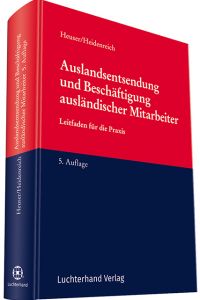7.1 The European Works Council
The EC Regulation, which has now also been transposed into national law by the legislator, provides for the introduction of a European works council. However, this law only covers groups of companies that have to fulfil precisely defined requirements. As a rule, small and medium-sized enterprises are not affected. Nevertheless, it should be pointed out that the European Works Council has so far had no co-determination rights whatsoever in the event of a posting abroad within Europe. However, it has extensive information rights and consultation possibilities at its disposal.
7.2 The works council
The employee is employed in the domestic and sending enterprise and is sent from here due to a business decision in the way of a personnel individual measure abroad. The structure of the right of co-determination stipulates that the works council can refuse approval in the event of a transfer of an employee for the reasons stated in § 99 II BetrVG. The agreement is considered however as given, if the work council misses the week period.
The transfer abroad
The Works Constitution Act does not differentiate between posting agreements and transfer agreements. It only uses the term transfer.
The transfer term consists of four aspects:
1. another work area is assigned to the employee,
2. this measure lasts longer than one month,
3. it is linked to a significant change in the working circumstances.
4. the BAG has also determined that the transfer is conceptually necessary with a
must be linked to a change of location.
It is undisputed that a transfer does not exist if the employee, according to the nature of his or her employment relationship, is not usually employed at a specific job in the country. According to the general view of traffic, it must be determined whether the change of job is typical for the employment relationship.
This is the case, for example, when a fitter changes jobs. The same applies to a sales representative. It is questionable with a pilot.
Hiring an employee exclusively for the purpose of the assignment is also not a transfer. Because he never belonged to the domestic company.
The courts have assessed the assignment of activities in Japan as a transfer and have based it on the change of location. However, the change of location alone was not sufficient.
The integration into a foreign company, which is also linked to a suspension agreement or a termination of the domestic contracts, was also assessed as a transfer.
Options for structuring
In any case, the works council's right of co-determination cannot be circumvented by making agreements under individual law to the contrary. Also another designation of the personnel individual measure changes nothing at the alone relevant legal evaluation of the procedure. Even the consent of the employee concerned cannot exclude the right of co-determination.
Termination by the domestic company of an employee posted abroad
The works council has a right of co-determination from §§ 102, 103 BetrVG in the event of termination of the employment contract with the company. The disregard of its right of objection leads to a procedural error, which makes the notice ineffective. However, there is also a right of co-determination in the event of termination during the period of employment abroad. A prerequisite, however, is that the employee belongs to the domestic company.
The termination of a seconded employee who has an employment contract with the sending company:
This employee works abroad in a permanent establishment, a branch or a representative office which, according to internationally valid standards, do not legally represent persons capable of acting, i.e. cannot have their own rights and obligations.
The dismissal of such an employee is subject to co-determination by the works council if it can be attributed to the sending company. This is possible according to the above criteria.
The termination of a seconded employee who has both an employment contract with the sending company and an employment contract with the receiving company:
This situation is sometimes brought about by a concordant will of the parties. Sometimes it results from the situation that the granting of a work/residence permit in the host country is linked to an employment contract concluded there. The employee then usually works for an independent subsidiary of the sending company, which is legally independent according to international legal standards, or for a foreign company.
The possibility of concluding several employment contracts at the same time is legally permissible. It is questionable, however, which contractual partner on the employer side is entitled to the right of termination. Or is both employers entitled to the right of termination together or perhaps everyone independently of each other? How does the termination of one employer affect the other's employment relationship? Could the co-determination right of the domestic works council be circumvented by the fact that the notice of termination is given abroad?
Is the employment relationship uniform or multiple?
The answer to these questions depends on how the relationship between the two employment contracts can be defined. A uniform or multiple employment relationship can be considered.
As a rule, a uniform employment relationship can only be terminated in its entirety and by and against all parties involved on the same side in the absence of an expressly deviating agreement. The necessary declarations need not always be made in a single act. Interpretation and reinterpretation of individual declarations of termination may lead to the result that they are individual partial acts of a uniform declaration of termination. If there are different termination dates, the latest will apply in case of doubt.
In the event that the BetrVG is applicable by way of broadcasting, the works council would have to be consulted pursuant to § 102. A termination that is already lawful under the employment contract statute of the foreign state would then also have to comply with the German standards. In practice, a whole series of problems could arise with regard to any deadlines to be observed.


